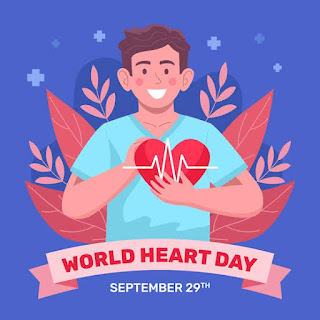Title: "Caring for Your Heart: A Doctor's Guide to a Healthier Life"
Introduction:
As a doctor, I've also seen the devastating impact that heart-related diseases can have on individuals and their families. That's why on this Heart Day, I want to share some vital insights into keeping your heart healthy and strong. Your heart is not just an organ; it's the very essence of your life. So, let's dive into the world of heart health together.
Understanding the Heart:
Before we discuss how to care for your heart, it's essential to understand what the heart does and why it's so crucial. Your heart is a powerful muscle that pumps oxygen-rich blood to every cell in your body. It works tirelessly, beating around 100,000 times a day. This steady flow of blood is essential to deliver nutrients and oxygen while removing waste and carbon dioxide.
Common Heart Problems:
Coronary Artery Disease (CAD): This occurs when plaque builds up in the arteries, narrowing them and reducing blood flow to the heart. CAD can lead to chest pain (angina) or heart attacks.
Hypertension (High Blood Pressure): High blood pressure puts extra strain on your heart, increasing the risk of heart disease, stroke, and other complications.
Heart Failure: This doesn't mean your heart stops beating, but rather it can't pump blood effectively, leading to fatigue, fluid retention, and shortness of breath.
Arrhythmias: These are irregular heart rhythms that can be harmless or life-threatening.
Valvular Heart Disease: Problems with the heart valves can disrupt blood flow and lead to various symptoms.
Preventing Heart Problems:
The good news is that many heart problems are preventable. Here are some essential steps you can take to keep your heart in top shape:
Eat a Heart-Healthy Diet: A diet rich in fruits, vegetables, whole grains, lean proteins, and low in saturated and trans fats can reduce your risk of heart disease.Stay Physically Active: Regular exercise helps maintain a healthy weight, lower blood pressure, and improve cholesterol levels.
Quit Smoking: Smoking is a major risk factor for heart disease. Quitting is one of the best things you can do for your heart.
Manage Stress: Chronic stress can contribute to heart disease. Find healthy ways to manage stress, such as meditation, yoga, or hobbies.
Control Blood Pressure and Cholesterol: Regular check-ups and medication, if necessary, can help keep these vital numbers in check.
Limit Alcohol: Excessive alcohol consumption can lead to high blood pressure and other heart problems. Moderation is key.
Maintain a Healthy Weight: Being overweight or obese increases the risk of heart disease. Achieving and maintaining a healthy weight is essential.
Get Enough Sleep: Quality sleep is crucial for heart health. Aim for 7-9 hours of restful sleep each night.
Conclusion:
Your heart is the engine of your body, tirelessly working to keep you alive. By adopting a heart-healthy lifestyle and getting regular check-ups, you can show your heart the care and attention it deserves. On this Heart Day, let's make a commitment to prioritise our heart health and take steps toward a longer, healthier life. Remember, a healthy heart is a happy heart, and a happy heart is a joyful life.

.png)
.jpeg)



.jpeg)

Comments
Post a Comment